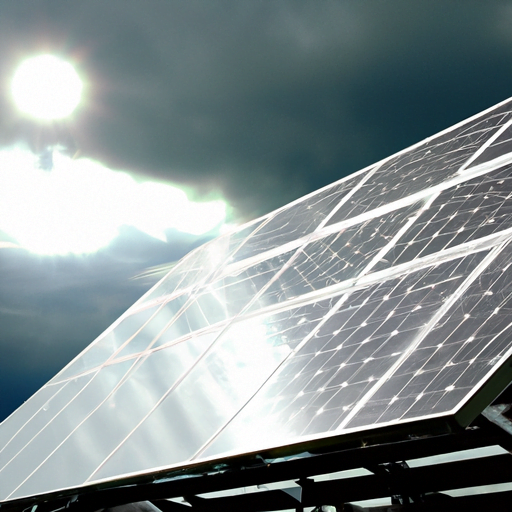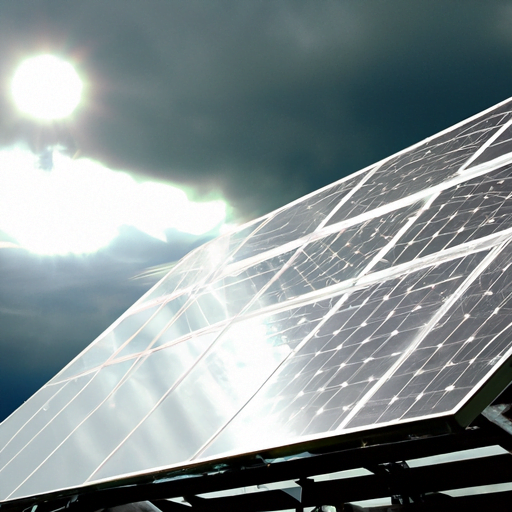Do you ever wonder if solar panels can generate electricity on cloudy days? It’s a common question for those considering renewable energy options. While we often associate solar power with bright, sunny days, the truth is that solar panels can still produce electricity even when it’s cloudy outside. In fact, they can still generate around 10-25% of their maximum capacity on a cloudy day.
Solar panels absorb sunlight and convert it into electricity using photovoltaic cells. While direct sunlight is ideal for optimal energy production, solar panels can still function in diffused or indirect sunlight. Cloudy days may reduce the amount of sunlight reaching the panels, but they can still generate electricity by harnessing the available sunlight.
It’s important to note that not all clouds are created equal when it comes to solar power production. Thick, dark clouds can dramatically diminish solar panel performance, while thin, wispy clouds have a lesser impact. Additionally, factors such as panel efficiency and tilt angle can also influence the amount of electricity generated on cloudy days.
So, while solar panels may not perform at their maximum capacity on cloudy days, they can still produce a significant amount of electricity. If you’re considering going solar and living off the grid, don’t let cloudy weather deter you. In our upcoming article, we’ll delve deeper into how solar panels work on cloudy days and share some tips for maximizing their efficiency. Stay tuned to learn more!
Can solar panels generate electricity on cloudy days?
Living off the grid has become a popular choice for individuals and families seeking to reduce their reliance on traditional energy sources. Solar panels are a key component of off-grid living, as they harness the power of the sun to generate electricity. However, a common concern among those considering solar panel installation is whether or not these panels can generate electricity on cloudy days. In this article, we will explore the technology behind solar panels, how they produce electricity, the effects of cloud cover on their efficiency, and the advancements in solar panel technology that have overcome the limitations associated with cloudy days.
Understanding solar panel technology
Before diving into the effects of cloud cover on solar panels, it is important to have a basic understanding of how these panels work. Solar panels utilize a technology called photovoltaics (PV) to convert sunlight into electricity. PV panels consist of numerous solar cells made of semiconductor materials, such as silicon. When sunlight hits these solar cells, it excites electrons within the semiconductor material, causing them to move and create an electric current.
How solar panels produce electricity
The process of producing electricity from solar panels can be simplified into three main steps: absorption, separation, and collection. First, sunlight is absorbed by the solar cells in the panel. This absorption is facilitated by the semiconductor material, which allows the conversion of light energy into electrical energy. Once absorbed, the sunlight separates the electrons from their atoms, creating a flow of electrons or an electric current. Finally, this electric current is collected by electrical contacts on the solar panel and can be used to power electronic devices or stored in batteries for later use.
Effects of cloud cover on solar panels
Cloud cover can have a significant impact on the efficiency of solar panels. When clouds block the direct sunlight from reaching the solar cells, the amount of energy that can be absorbed and converted into electricity decreases. This is due to the fact that clouds act as a filter for sunlight, scattering and absorbing a portion of the solar radiation. As a result, the intensity of light reaching the solar cells is reduced, which in turn reduces the amount of electricity the panels can generate.
Overcoming limitations with advanced solar panel systems
Advanced solar panel systems have been developed to overcome the limitations posed by cloud cover. One such advancement is the use of solar panels with anti-reflective coatings. These coatings are designed to reduce reflection and increase the amount of sunlight that can be absorbed by the solar cells. By minimizing reflection, anti-reflective coatings allow for a higher absorption of light, thus increasing the efficiency of solar panels on cloudy days.
Another innovative solution is the use of hybrid solar panel systems. These systems combine the benefits of traditional solar panels with other forms of renewable energy generation, such as wind or hydro power. By incorporating multiple sources of energy generation, hybrid solar panel systems can compensate for the decrease in electricity production during cloudy days. For example, when sunlight is limited, wind turbines or hydroelectric systems can take over and continue to generate electricity.
Conclusion
So, can solar panels generate electricity on cloudy days? The answer is yes, although their efficiency is significantly reduced. Cloud cover can impact the amount of sunlight reaching the solar cells, leading to a decrease in electricity production. However, advancements in solar panel technology, such as anti-reflective coatings and hybrid systems, have provided solutions to overcome these limitations. By increasing the absorption of sunlight and incorporating alternative energy sources, solar panels can still generate a valuable amount of electricity even on cloudy days.
If you are considering investing in solar panel installation, it is important to consider the climate and average cloud cover in your region. While solar panels can still provide significant energy savings and reduce your carbon footprint, their efficiency may be lower in areas with frequent cloud cover. Consulting with a solar panel professional can help you gauge the potential benefits and limitations of solar energy in your specific location.
In conclusion, solar panels are a viable option for generating electricity on cloudy days, thanks to advancements in technology. With a combination of anti-reflective coatings and hybrid systems, you can continue to harness the power of the sun for your energy needs, even when the clouds roll in. So, go ahead and embrace the sustainable benefits of solar energy, rain or shine.





